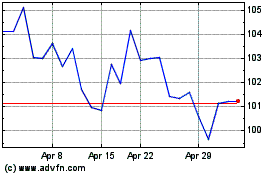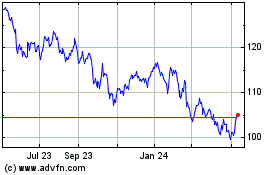Nestlé to Sell U.S. Ice Cream Business to Joint Venture --Update
December 11 2019 - 2:43PM
Dow Jones News
By Saabira Chaudhuri
Nestlé SA has agreed to sell its U.S. ice cream arm to a joint
venture it has with private-equity firm PAI Partners for $4
billion, a deal the Häagen-Dazs maker hopes will reinvigorate the
struggling business.
The sale, which also includes the Dreyer's and Drumstick brands,
follows a similar move in Europe and comes amid fierce competition
in the world's largest ice cream market.
Nestlé has been working to improve profit margins at the
division but has seen its U.S. market share decline in recent
years, dropping to 15% last year from 19.3% in 2010, according to
Euromonitor. The Swiss company, which focuses on premium ice cream,
has faced intense competition in that segment from market leader
Unilever PLC as well as upstart brands like Halo Top.
In selling its U.S. ice cream operations -- the country's second
largest with sales of $1.8 billion last year -- Nestle hopes to
replicate a move it says has been successful in Europe.
The packaged-food giant in 2016 merged its European ice-cream
business with PAI-owned R&R Group, which makes brands like
Cadbury Flake Cones and Rowntree's Fruit Pastille lollies, to
create Froneri.
That business has since expanded, logging sales of 2.9 billion
Swiss francs ($2.95 billion) last year, and Nestlé on Wednesday
said it was convinced the success of that model could be extended
to the U.S.
Ice cream, while high-growth compared with many other
packaged-foods categories, has increasingly looked like an oddity
at Nestlé. The company says it wants to focus on healthy,
nutritious food and has been cutting salt and sugar in many of its
products.
Nestlé has also recently been sharpening its focus, selling
businesses including U.S. confectionery, and putting greater
emphasis on a handful of businesses like bottled water, coffee and
pet food.
Nestlé and Unilever -- which owns Magnum, Ben & Jerry's and
Talenti -- have both been working on ways to make their ice cream
business less open to seasonal vagaries, through marketing,
delivery and convenience.
Americans eat more ice cream per capita than any other people in
the world, with most bought in supermarkets for consumption at
home, leaving the category open to intense discounting.
In contrast to Nestlé's declining market share, Unilever has
grown its U.S. share to 20.9% last year from 17.9% in 2010,
according to Euromonitor. In the face of tough competition, the
world's largest ice cream maker has launched its own high-protein,
low-sugar line under the Breyer's brand to counter Halo Top. It
also last year rolled out Culture Republick in the U.S., a
low-calorie ice cream brand containing probiotics in flavors like
turmeric chai and cinnamon, and milk and honey.
Nestlé said the sale of its U.S. ice cream business was expected
to close in the first quarter of next year and that it would
continue to manage its remaining ice cream operations in Canada,
Latin America and Asia as part of its current market structure.
Write to Saabira Chaudhuri at saabira.chaudhuri@wsj.com
(END) Dow Jones Newswires
December 11, 2019 14:28 ET (19:28 GMT)
Copyright (c) 2019 Dow Jones & Company, Inc.
Nestle (PK) (USOTC:NSRGY)
Historical Stock Chart
From Mar 2024 to Apr 2024

Nestle (PK) (USOTC:NSRGY)
Historical Stock Chart
From Apr 2023 to Apr 2024
